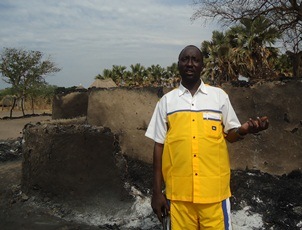Jonglei Peace Initiative provides optimism
April 26, 2012 (BOR) – Consultative community meetings began in Jonglei on Wednesday as part of the Presidential Peace Committee (PCC) efforts to find a lasting solution to the troubled state’s cattle-raiding and inter-ethnic violence.

The meetings seek to gather the grievances which each community believes to be the main causes of the inter-ethnic conflicts which have led to death and displacement of thousands of people in recent years.
In January the UN estimated that 120,000 people had been displaced by the conflict, which is predominantly between members of the Murle and Nuer ethnic groups.
National and state Members of Parliament and traditional leaders converged in Bor, Ayod, Pibor and Waat for the four-day meetings.
Jonglei State is home to pastoralist communities that have long engaged in cattle-rustling and allegedly child abduction. Of the six main ethnic groups in Jonglei, the Dinka Bor, Nuer and Murle have being fighting more intensively since the 2005 peace deal ended the Sudanese civil war (1983-2005) but left South Sudan awash with small arms.
The conflict reached a peak last year when over 6,000 armed Lou-Nuer youth carried out a revenge attack on the Murle of Pibor county. That fighting left an unconfirmed number of people dead and led to the displacement of over 10,000, according to the UN.
There has been scant information from the Murle Diaspora and the Murle in South Sudan on their perspective of the conflict, unlike the vocal Luo-Nuer who claim that the Murle have been driven to abducting their children as they are suffering from an infertility endemic; a view shared by the president of South Sudan, Salva Kiir.
According to the UN Environmental Program the Murle were in Ethiopia until the 19th century. Some remained their until the 1990s while others were driven west by local Nilotes. They established an homeland in Pibor county, Jonglei State in the 1930s, since which, environmental pressures have impinged upon their pastoralist lifestyle.
Little evidence can be found to support the infertility claim. However, the motivation to rationalise the denigration of one of South Sudan’s pariah ethnic groups, in order to legitimise the attribution of blame, is self-evident.
Many peace initiatives have come and gone but ethnic feuds continue in Jonglei. Formed by Kiir in January, the peace committee is headed by Archbishop Daniel Deng, who remains optimistic that long-lasting peace can still be realised through dialogue.
“It is only when people come together and speak peacefully [that] peace can be restored in Jonglei State,” Deng told a gathering of Greater Bor leaders on Wednesday in Bor, the capital of Jonglei state.
However, incidents of cattle rustling have continued in areas of Bor, according to officials who say gunmen have taken up to 300 cattle in north Bor since March. Last week, ten cattle were looted in Twic East county.
John Penn de Ngong, the secretary for the Jonglei Peace Initiative admitted on Thursday that some “actors of peace indicates that the process may not have significant effects on improving security in villages.”
Bishop Ruben Akurdit Ngong, who heads Jonglei state churches, said the current approach could achieve peace in Jonglei “because everybody is being represented and people are speaking freely.”
Akurdit told reporters in Bor on Wednesday that peace initiatives in the state had “never been done this way before.”
The consultative meetings will investigate the causes of the inter-tribal conflicts and how to address them.
All communities will meet next month in Bor, the capital of Jonglei State, with each county sending seven representatives as well as members of parliament and various specialists.
(ST)
